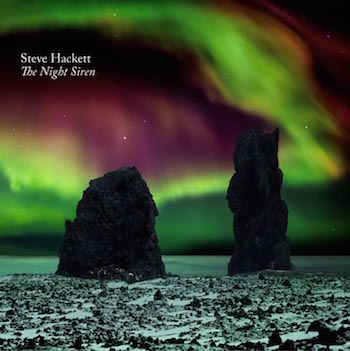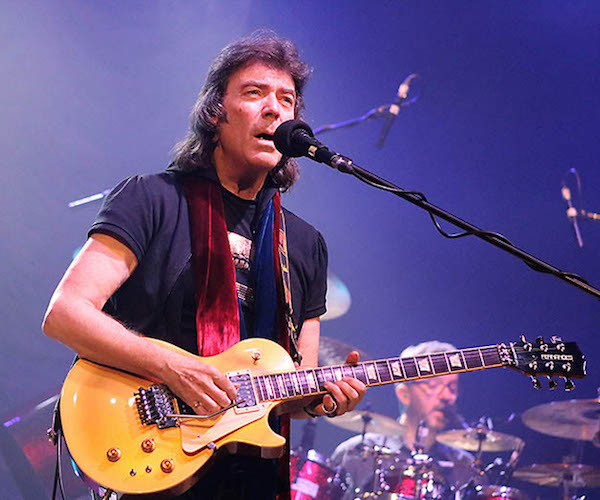Music Interview/Review: Former Genesis Guitarist Steve Hackett Crosses Musical Borders
“My ancestors fled pogroms in Poland and today we have a crisis to rival what went on in the 1940s.”
By Jason M. Rubin

Never is art more important, more useful, than in times of political and social upheaval and unrest. Art, and music in particular, sheds light on tyranny and injustice, gives voice to the persecuted and dispossessed, and builds community through the articulation of shared values and concerns. And while some art and music can be useful in such times by simply providing escape and diversion, they can also give one hope by expressing a vision of a better, more unified world.
The latter vision is a driving force on the new album from former Genesis guitarist Steve Hackett. The Night Siren will be released on March 24; he will perform material from the new LP, as well as a selection of Genesis tracks and other songs from his solo career, when Hackett presents his live show “Genesis Revisited with Classic Hackett” on February 26 at Boston’s Wilbur Theatre.
What makes The Night Siren a work of hope is that, in this highly divisive time, Hackett has assembled a melting pot of musicians from around the globe. And he has recorded 11 tracks that serve as an aural travelogue of music that’s as rich and remarkable as this fragile orb we inhabit. For example, a pair of vocalists, Kobi Farhi and Mira Awad, are from Israel and Palestine, respectively. Both work to bring their peoples together. Malik Mansurov is from Azerbaijan and plays the tar, an Iranian lute-type instrument. Drummer Gulli Breim is from Iceland. We also hear the Arabic oud, the Peruvian charrango, Celtic Uileann pipes, Australian didgeridoo, and two types of exotic flutes, the Armenian duduk and the Andean quena. These instruments blend seamlessly and sumptuously with the line-up of Western instruments and musicians.
Though the concert precedes the release of The Night Siren, I opened my recent telephone interview with Hackett wanting to know what inspired his border-crossing album.
“My wife Jo and I have traveled and made friends around the world,” he explained. “During a trip to Cambodia and Thailand, we were struck by the beautiful ancient temples, yet we were mindful that these places were once decimated by war. It’s wonderful that so many of these sites are still intact. It was very inspiring and made me realize how much we have to lose by carrying on the way we do.
“I started out making a rock album,” he continued, “but with all these influences in my head it turned into a world music album. I was fortunate to be able to get so many talented musicians to play on it. This may sound pretentious, but musicians are natural ambassadors of peace; we travel and meet different people, and we’re able to create music together in a multicultural way. It’s how it should be.”
For all of the album’s good intentions, its themes are dark reflections on the chaotic state of the world. For example, the opening song is called “Behind the Smoke” and is about refugees. Making use of a forebodingly insistent middle eastern rhythm (reminiscent of Led Zeppelin’s “Kashmir”), Hackett’s vocal and guitar are as haunting as David Bowie’s death-infused “Blackstar.” Still, at about the halfway point of the seven-minute song, the tar enters, playing a sort of dance melody. This uneasy merging of disparate cultures is followed by a brief drum solo, punctuated by the vocals of Amanda Lehmann, which gives way to a Hackett guitar solo, which generates increasing waves of energy that climax and then gently fade out. A powerful beginning.
The second track, “Martian Sea,” is a hard rocking tune that features a metal electric guitar solo that gives way, strikingly, to sitar. “It’s a bit like a relay team,” Hackett commented, “when one genre tires, another comes in.”
Hackett’s own classical guitar chops come to the fore in “Other Side of the Wall,” a song that recent events has made particularly relevant. Appropriately, Hackett wields the charrango in the first part of the tune “Inca Terra,” which, following the global/eclectic approach of the album, eventually gives way to racing drums and soaring electric guitar.
The Israeli and Palestinian singers appear on the penultimate track, “West to East.” Joined on vocals by Steve, Jo, and Lehmann, it almost becomes a hymn for peace as they sing “Shine a light from West to East.” The final song is a melancholic instrumental entitled “The Gift.” I asked Hackett if it was intended to be a pessimistic wrap-up to the album.
“I actually didn’t write that,” he explained, “I just liked the melody and used it. I think it’s a haunting melody and it is in a minor key. But I didn’t set out to make an album that was doom and gloom. I think there are moments of great joy on it. It’s just that the world is in a fragile state right now. My ancestors fled pogroms in Poland and today we have a crisis to rival what went on in the 1940s. We have to address it. We cannot marginalize people wholesale.”

Steve Hackett performing at the Lynn Auditorium in November 2015. Photo: Jerry Lofaro.
On tour, Hackett has a more conventional band, spearheaded by longtime collaborator Roger King on keyboards with Matt Sylvan on vocals, Gary O’Toole on drums, Rob Camden on flutes and saxes, and Nick Banks on bass. Revisiting Genesis is nothing new for Hackett, who was a member of the group from 1971 to 1977. Having surveyed its repertoire on four previous recordings, this year he is focusing on the 40th anniversary of Wind & Wuthering, the final full-length studio album on which he appeared, and the second to be released following the 1975 departure of original lead vocalist Peter Gabriel. In addition to performing most of that LP, he will also do “Inside and Out,” an outtake from those sessions which was released on the non-US EP, Spot the Pigeon.
“I get to do the [Genesis] music that I think is best,” Hackett insisted. “I like to honor the early music of the band, particularly the time we had Peter. When I did the first Genesis Revisited album [1996], I was more interested in variation; now I want to do authentic versions. I may change things in terms of the vocal arrangements or the guitar solos, but if something is quite iconic I keep it.”
Spanning early and later Genesis, the breadth of Hackett’s 42-year solo career, and his new album, The Night Siren, the show at the Wilbur Theatre may well be an iconic evening. The US leg of Hackett’s tour ends on March 3 with a collaboration with the Buffalo Philharmonic Orchestra. Then he heads off to Europe through May, spreading his musical message of unity and possibility.
Jason M. Rubin has been a professional writer for 31 years, the last 16 of which has been as senior writer at Libretto, a Boston-based strategic communications agency. An award-winning copywriter, he holds a BA in Journalism from the University of Massachusetts Amherst, maintains a blog called Dove Nested Towers, and for four years served as communications director and board member of AIGA Boston, the local chapter of the national association for graphic arts. His first novel, The Grave & The Gay, based on a 17th-century English folk ballad, was published in September 2012.
